The ancient Greeks and Romans believed dreams revealed the future and even messages from the dead. Freud thought they expressed our repressed desires. Today, most of us are a lot less serious about the way our minds wander while we sleep.
Still, it's hard to resist the urge to interpret dreams – particularly when they're strange or unsettling. After waking from a taboo dream or terrifying nightmare, we often question what it reveals about who we are. Who wouldn't wonder if our hidden fears and ugly impulses emerge as we slumber?
For this project, we asked nearly 1,000 individuals to share the content of their strange, scary, and scandalous dreams. We also studied the emotions they expressed about these fantasies and nightmares to gauge the horror and shame they sometimes felt afterward. Our findings suggest bizarre dreams are more ordinary than most of us imagine and that many people have certain themes and feelings in common. To learn how the content of your dreams compares to what others see in their sleep, keep reading.
Nightmare Narratives
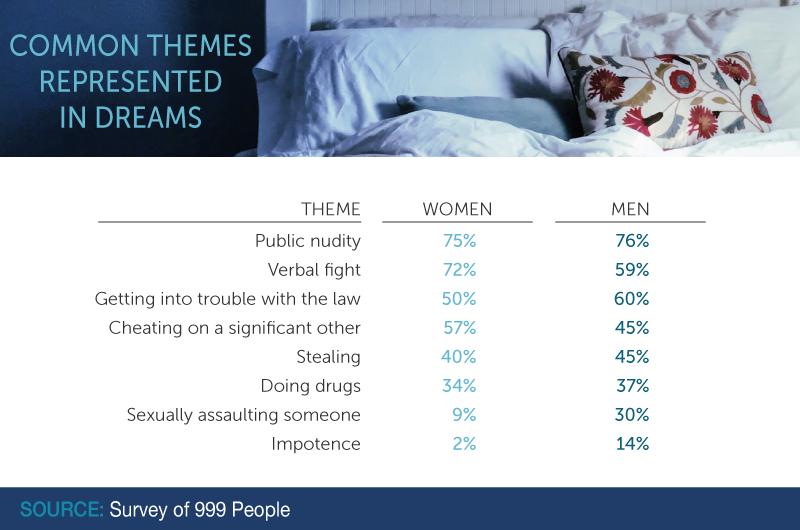
There's no way to predict exactly what will show up in our dreams, but some scenarios and themes seem pretty common. For example, more than three-quarters of men and women experienced dreaming about public nudity. Psychologists suggest this dream could indicate that you're concealing something embarrassing from those around you or possibly feeling inferior. Other common dream plotlines included verbal fights (which women experienced at a higher rate) and being in trouble with law enforcement (experienced by a larger portion of men).
Women were also substantially more likely to dream about cheating on their partners than men. In reality, research on cheating suggests men do it far more often, so such dreams probably don't tell us much about behavior. Men, however, were more likely to dream about non-consensual encounters, with 30 percent reporting dreams in which they sexually assaulted someone. Fourteen percent of men also admitted to dreams in which they were impotent, an ironic finding given how often men experience erections in their sleep.
Nocturnal Nemeses
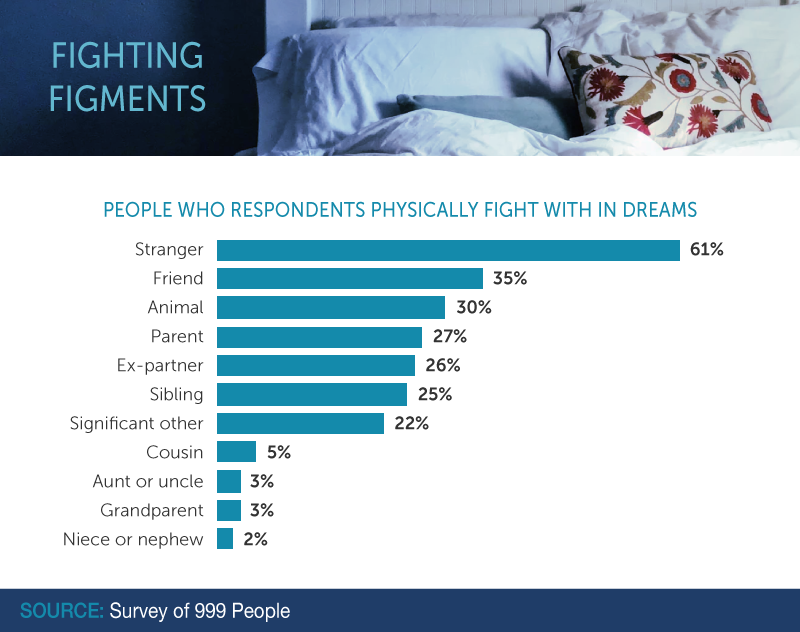
If a lot of people dream about physical combat, who are their most frequent opponents? Strangers were the most common enemy in these dream showdowns by far, but many respondents also reported squaring off against people they knew intimately. While sleep researchers and psychologists caution against reading too much into the people who appear in your slumber situations, it's hard not to feel uncomfortable when you run into someone after dreaming about beating them up the night before.
More than a third of respondents dreamed of fighting a friend, and at least a quarter each reported trading imaginary blows with a sibling, parent, or ex-partner while sleeping. Even significant others were relatively common targets. These fantasy fights weren't limited to human opponents, either: 30 percent of respondents brawled with an animal in their dreams, a frightening prospect regardless of the creature in question.
Desired in Dreams
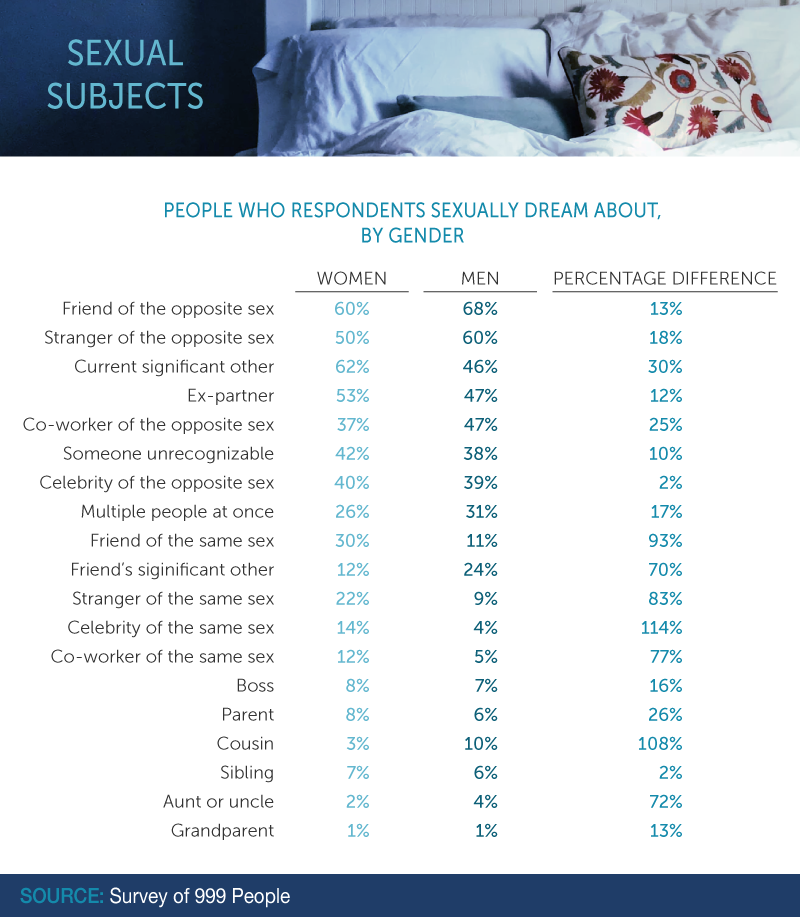
If sex dreams are fairly common, who are our sexual partners in these fantasies? For 60 percent of women and 68 percent of men, a friend of the opposite sex played the role of the lover. Actually, several common sex fantasies involved someone our respondents knew well, including an ex-partner or co-worker of the opposite sex. Experts, however, warn us not to equate a sex dream featuring someone we know with a real desire to sleep with them. The truth is often more nuanced: They may represent an abstract characteristic we seek in a partner, such as confidence.
Other frequent sex-dream scenarios involved perfect strangers or someone our respondents couldn't recognize clearly. Additionally, men and women had sex dreams about celebrities at roughly equal rates. On the other hand, some folks remained faithful even in their sleep: 62 percent of women and 46 percent of men reported sex dreams involving their significant other.
Bad Dreams: Sentiment and Significance
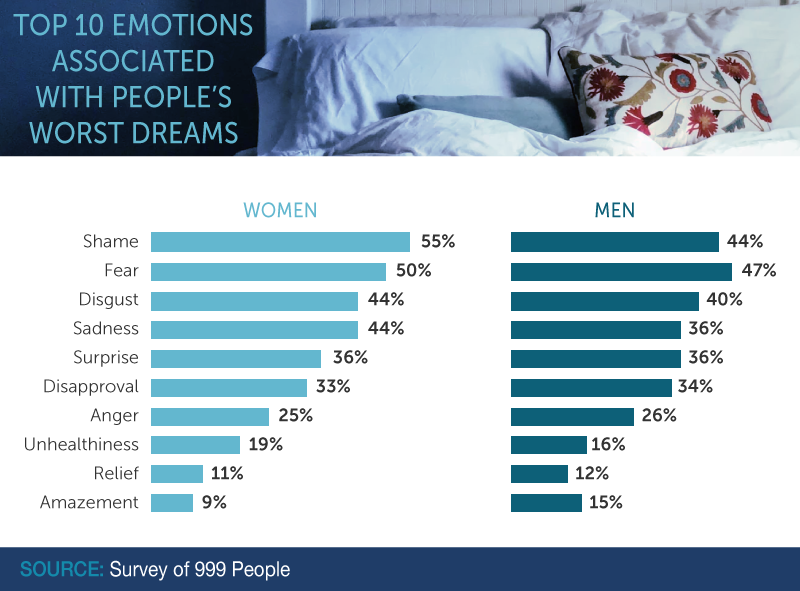
Although most people experience nightmares infrequently, some people find them deeply disturbing and disruptive to their sleep: They can even cause a disorder in extreme cases. While our respondents reported several unpleasant emotions in connection with their own worst dreams, shame and fear were felt most frequently. Interestingly enough, women reported feeling shame and fear at higher rates than their male counterparts, a result that may reflect the waking experiences of men and women as well. Recent studies indicate women experience guilt-related emotions with greater frequency, perhaps due to culturally enforced gender roles.
Women were also more likely to report disgust and sadness in conjunction with their worst dreams, but both genders reported similar results with regard to surprise, disapproval, and anger. Additionally, men were more likely to feel amazed in their bad dreams. Another 19 percent of women and 16 percent of men said their dreams made them feel unhealthy – why would so many people assume their dreams revealed a lack of well-being?
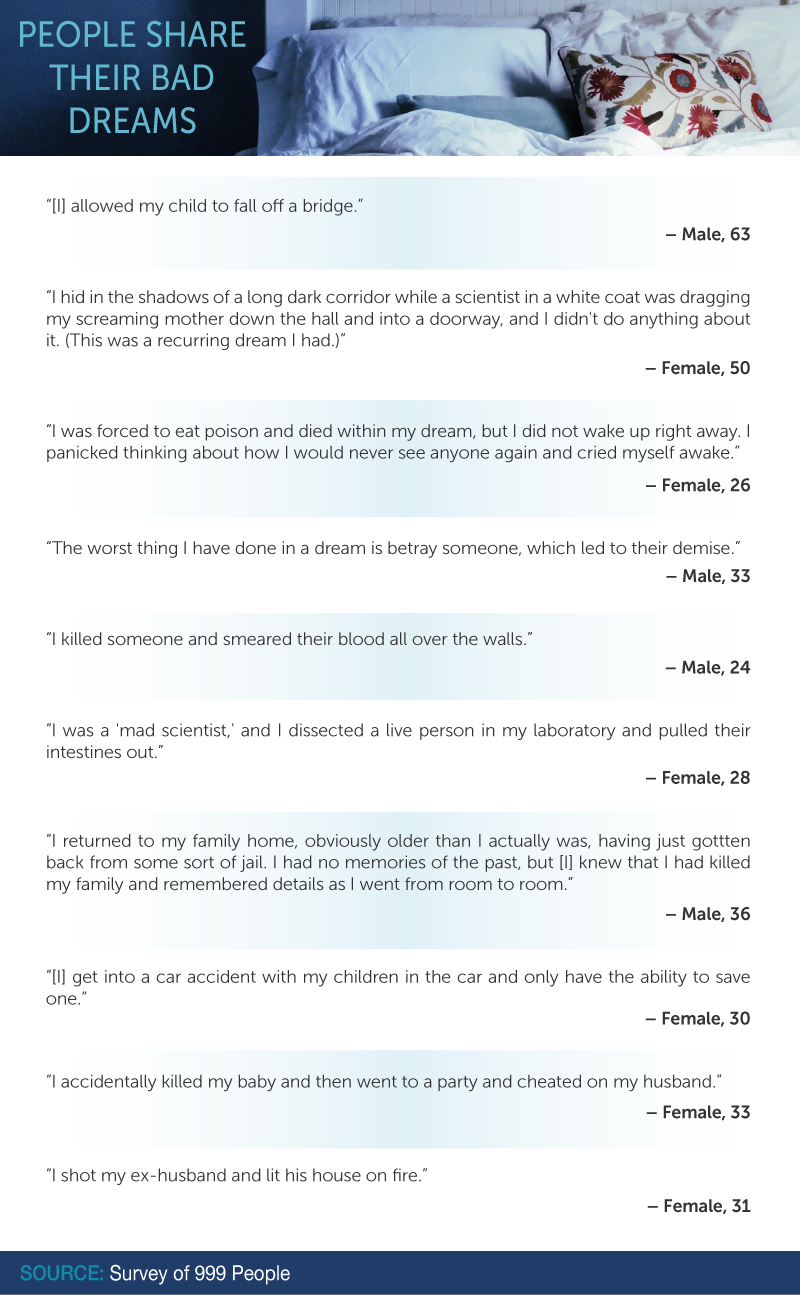
Nocturnal Effects
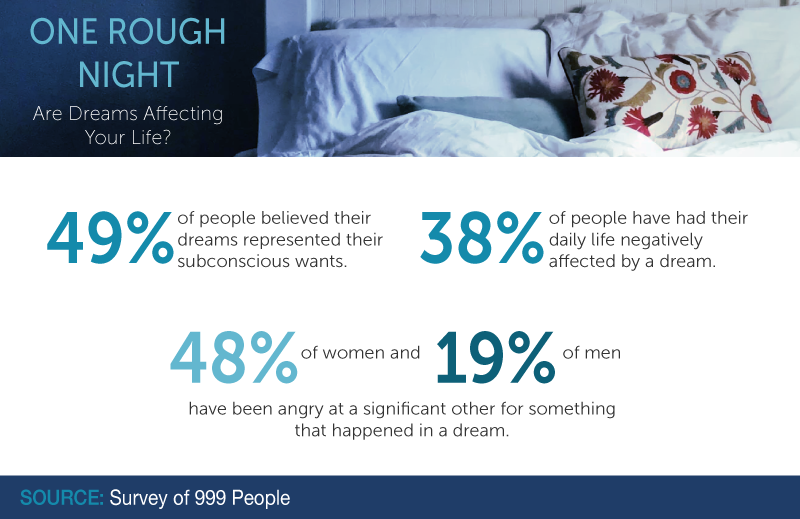
Nearly half of respondents believed dreams revealed their deep desires (no wonder so many felt ashamed or concerned about the content of their nightmares). This concept probably stems from Freud's idea that dreams reflect our unfulfilled impulses, although many scientists find this notion too simplistic. Whether dreams indicate anything about our true inclinations, they seemed to exert a harmful influence in some cases. In fact, nearly 4 in 10 respondents reported a dream had adversely affected their daily life.
One such negative outcome could be hard feelings toward one's significant other. Roughly half of women reported feeling angry with a partner about something that happened in their dreams. A much smaller portion of men reported similar feelings. Some experts suggest dreams about a partner's betrayal could indicate deeper insecurities at work in the relationship, so while they might warrant a conversation, they probably don't require a confrontation.
Dream Disclosure
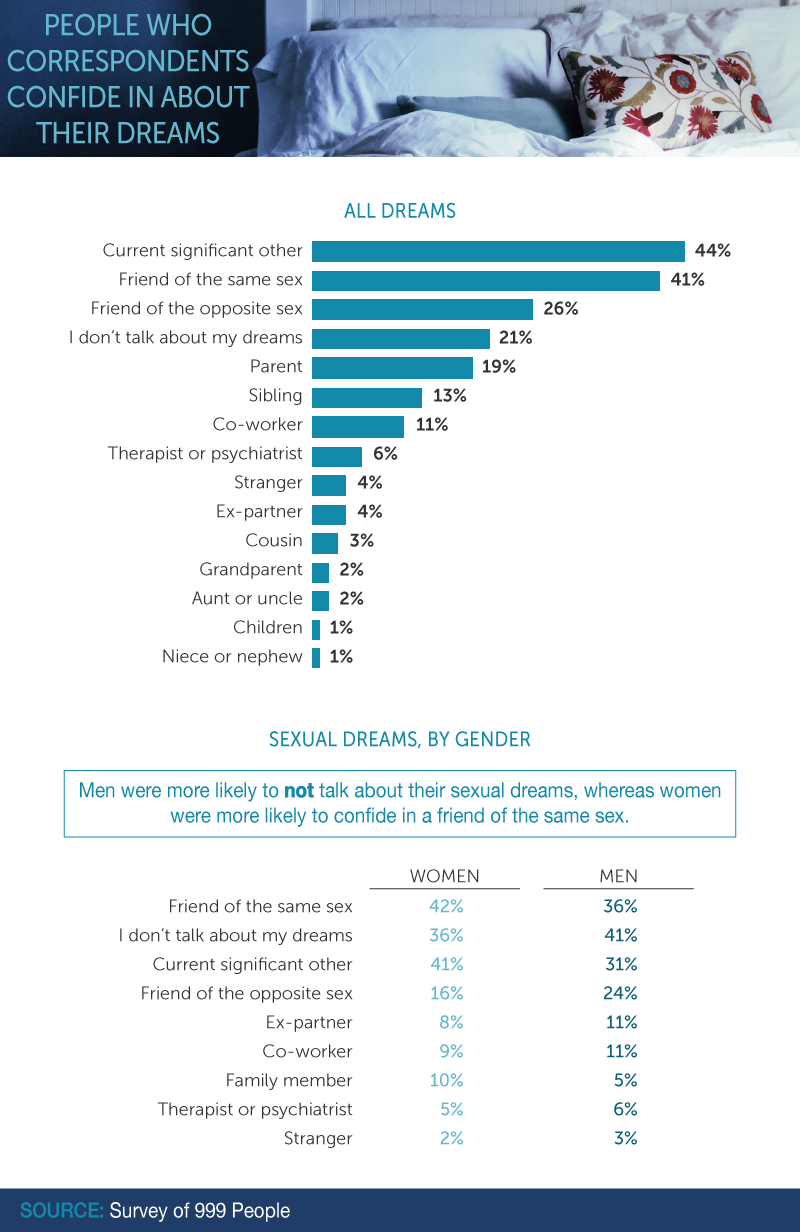
Talking about one's dreams is a debatable move: Some say you're likely to bore your audience, while others suggest it can help you grow closer to people. Significant others were the most popular confidants among our respondents, although nearly as many shared their dreams with a friend of the same sex. Parents were another common resource for dream disclosure, but nearly a quarter of people opted to keep their dreams to themselves.
Sexual dreams, however, prompted a very different sharing pattern. Significant others were not the most common outlets for sexual content, although women tended to be more transparent with their partners. Female respondents were also more likely to share with a friend of the same sex, whereas men were more likely to keep quiet about their sex dreams. Interestingly, men were more likely than women to share their sex dreams with friends of the opposite gender and their exes. Here's hoping they got their listener's permission before describing the steamy details.
Resting Easy With Your Dreams
Our findings reveal the weird wanderings of our minds at night and the strong emotions that strange dreams bring up. But however odd we find our own nightmares, our results should help normalize the strangeness of certain uncomfortable dreams. As revealed by our study, most people have felt uncomfortable about the content of their dreams, including feelings of shame in many cases. Perhaps in interpreting our dreams, we should strive to be kinder in our judgments about ourselves. Whatever your strange dreams may signify, it doesn't mean there's something wrong with you.
Poor sleep, however, can pose serious risks to your health and happiness. That's one reason you should get acquainted with Leesa's mattresses, which are exceptionally well-made using American materials. Thanks to our uncompromising quality, you'll get the kind of sleep you've only dreamed of – at a surprisingly affordable price.
Methodology
We surveyed 999 people through Amazon's Mechanical Turk. All of the data presented are based on self-reporting, which comes with limitations such as exaggeration and under-reporting.
Our respondents ranged in age from 18 to 73, with the average age 35.3 and a standard deviation of 10.8. Our respondents were 49 percent female and 51 percent male.
For all of the questions present, respondents were shown a preset list of responses, such as emotions and various personal relationships. They were also given the opportunity to write in their own responses for all questions.
The data have not been weighted nor have they been statistically tested. Therefore, the findings of this study are for entertainment purposes only.
Fair Use Statement
We welcome you to share our findings and images for noncommercial purposes – a wider audience for our work sounds dreamy. If you do use any part of this project, just link back to this page to credit our team appropriately.



